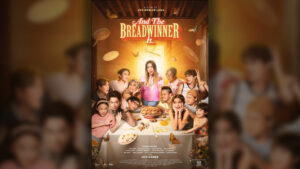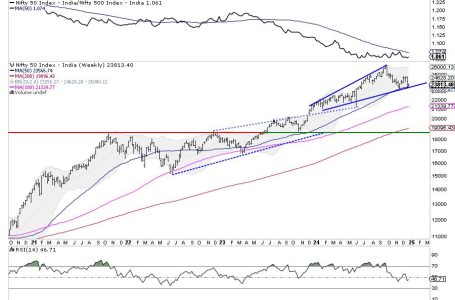Week Ahead: While NIFTY Consolidates, Closing Above This Level Crucial To Avoid Weakness
Metro Manila Film Festival 2024: Vice Ganda goes serious, for a moment

By Edg Adrian Eva, Reporter
Movie Review
And the Breadwinner is
Directed by Jun R. Lana
Produced by Star Cinema and The IdeaFirst Company
Vice Ganda’s films have consistently drawn polarized reactions over the years. While they undeniably connect with their target mass audience through Vice Ganda’s signature comedic style — made up of one-liners, puns, and parodies — some critics find the movies’ reliance on a repetitive formula less than appealing. The heavy use of slapstick humor and exaggerated scenarios is entertaining to many, but for some it often detracts from the films’ depth and artistic value.
However, in Vice Ganda’s newest film, And the Breadwinner Is, for this year’s Metro Manila Film Festival, the buzz suggests a potential shift in tone. The teaser hints at a more serious and dramatic narrative, balanced with the familiar nuances of comedy that have defined Vice Ganda’s style. This fresh direction is intriguing, particularly for someone who grew up watching Vice Ganda’s films.
As the film’s title suggests, Vice Ganda, playing Bambi Salvador, is established as the breadwinner of her family, taking on multiple jobs in Taiwan to support her big family in the Philippines. The movie starts strong, with Bambi narrating her hardships, supported by visuals that effectively show her unwavering dedication to building her family’s dream house.
Of course, it’s a Vice Ganda film, so comedy is always present, but what makes it more effective is how the comedy appears in the most unexpected scenes —moments that are sad or frustrating in nature. For example, in one scene the OFWs use the coffin of a recently deceased coworker to store their pasalubong or balikbayan items (gifts for those at home) — it’s a bit disturbing but hilarious at the same time. That they are unexpected makes the comedic moments in the initial part of the movie more effective.
However, when Bambi returns to the Philippines, the movie’s plot takes a downturn. What began as a balanced comedic-dramatic story shifts into full-blown comedy, reverting to the old formula. These moments could have been used to develop the character of Baby Salvador — Bambi’s older sister (played by comedian Eugene Domingo) — whose abandonment of her responsibilities is crucial to Bambi becoming the family’s sole breadwinner.
The comedic and swift reconciliation of Baby with her family, after being absent for more than 15 years, feels emotionally unrealistic. The family immediately accepts her with warmth, except for Bambi, who eventually accepts her as well. This feels like lazy writing, given how her character was established at the beginning of the film.
A visual portrayal of Baby leaving the family, Bambi’s turning point as the breadwinner, and Baby’s reasons for leaving and returning would have added depth to the characters, making their motivations more compelling — in a similar manner with how the initial narration was supported by effective visual cues.
While there are attempts to address these conflicts through occasional confrontational scenes, the movie’s shift to full-blown comedy and its rapid emotional transitions makes these scenes feel forced, as if they are included just to keep the plot moving forward.
The highlight of the movie is the single-camera confrontation scene between Bambi, Baby, and the rest of the family, notably younger brother Biboy Salvador, played by Jhong Hilario. As mentioned in an interview with the press, this intense moment was filmed in just one take.
Director Jun Lana’s vision for the scene is clear — he aims to immerse the audience, making them feel as though they are right there, witnessing the confrontation. However, this method has its drawbacks, as the single camera angle doesn’t fully capture the characters’ facial expressions. This scene is pivotal for Bambi and for the family to express their repressed emotions, and had it been executed better, like the confrontational scenes in Anak or Four Sisters and a Wedding, it would have been more effective.
Nonetheless, Vice Ganda’s acting workshop clearly paid off here, as she effectively conveys the burden and exhaustion of being the family’s breadwinner for so long.
Overall, And the Breadwinner Is holds strong appeal for Filipino families, thanks to Vice Ganda’s enduring star power and its family-centric theme. Had the film focused more on Bambi’s struggles and further explored how her years of hard work led to disappointment, while delving deeper into her conflict with Baby, with a more nuanced use of comedy, it could have been a standout moment in Vice Ganda’s movie career.
MTRCB Rating: PG










